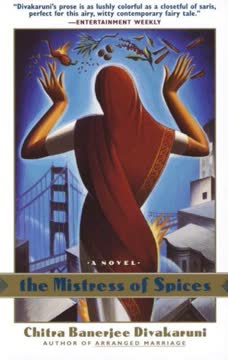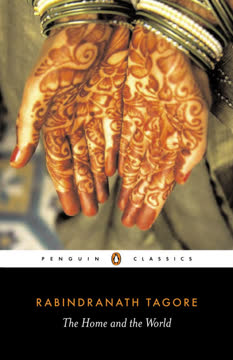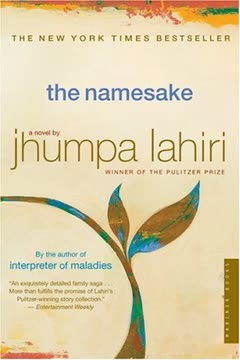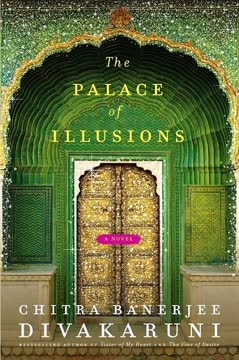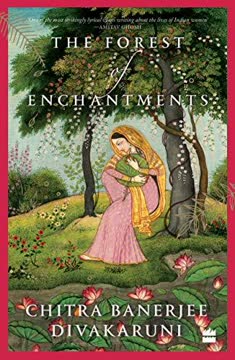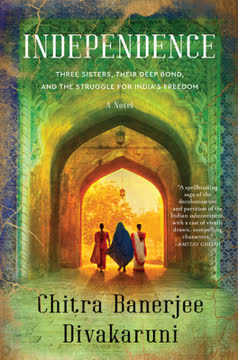Plot Summary
Spices and Secret Power
The story opens with Tilo, the Mistress of Spices, who runs a small Indian spice shop in Oakland, California. She is not just a shopkeeper but a powerful healer, trained in the ancient arts of the spices, each of which holds mystical properties. Tilo can sense the desires and pains of her customers, using the right spice to heal, protect, or guide them. The spices are her true love and her masters; she must obey their rules, never using their power for herself, and never growing too close to those she helps. The shop is a sanctuary for immigrants, a place where their longings and sorrows are as palpable as the scents in the air. Tilo's identity is a secret, her true self hidden beneath the guise of an old woman, her real age and past concealed by magic and duty.
Tilo's Many Transformations
Tilo's life is a series of transformations. Born as Nayan Tara in a poor Indian village, she is marked from birth as different, possessing the gift of sight and prophecy. Her powers bring her both reverence and isolation. After a traumatic attack by pirates—an event she unwittingly calls upon herself—she becomes Bhagyavati, the pirates' queen, wielding her powers for vengeance and survival. Eventually, she is rescued by sea serpents and guided to a mystical island, where she is reborn as Tilo, apprentice to the Old One, and trained to become a Mistress of Spices. Each identity is a shedding of the past, a necessary sacrifice for the next stage of her journey.
The Island of Apprenticeship
On the island, Tilo and other girls are trained by the Old One in the art of the spices. The apprenticeship is rigorous, demanding total renunciation of personal desire, beauty, and love. The Mistresses must take on old bodies, never leave their assigned places, and never use the spices for themselves. The Old One warns Tilo, whose passionate, rebellious nature makes her both the most gifted and the most dangerous apprentice. The island is a place of sisterhood, discipline, and mystical learning, but also of loneliness and longing for the world left behind.
The Store in Oakland
Tilo's spice shop in Oakland becomes a microcosm of the immigrant experience. The store is filled with the scents and colors of India, a place where the past and present mingle. Tilo dispenses spices and advice to a cast of characters: Ahuja's wife, the bullied boy Jagjit, the ambitious Geeta, the traumatized Haroun, and many others. Each customer brings their own pain, longing, and hope, and Tilo must balance her compassion with the strict rules of her calling. The store is both a haven and a prison, as Tilo is forbidden to leave or form attachments.
The Immigrant's Longing
The shop's customers are united by their longing—for home, for acceptance, for love, for transformation. Tilo sees herself in their struggles, especially in the women who suffer in silence, the children caught between cultures, and the men broken by disappointment. She uses the spices to help them, but the boundaries between healer and healed begin to blur. Tilo's empathy grows, and with it, her temptation to break the rules that keep her apart.
Suffering and Healing
Tilo's interventions are both magical and deeply human. She gives turmeric for protection, fennel for courage, fenugreek for desire, and chili for strength. She helps Ahuja's wife find the courage to leave her abusive husband, gives Jagjit the strength to resist gang violence, and tries to heal the rift in Geeta's family over her love for a Chicano man. But the more Tilo intervenes, the more she risks upsetting the delicate balance the spices demand. Healing comes at a cost, and not all her efforts succeed.
The Rules of the Mistress
The Mistresses of Spices must follow strict rules: never use the spices for personal gain, never touch those they help, never leave their assigned place, and never fall in love. Tilo's rebellious heart chafes against these rules, especially as she grows closer to her customers and begins to desire a life beyond the store. The Old One's warnings echo in her mind, but Tilo's compassion and longing for connection drive her to the edge of disobedience.
The Temptation of Love
Tilo's world is upended when a mysterious American man, Raven, enters her shop. He is drawn to her, sensing the magic beneath her disguise, and she is drawn to him in turn. Raven is himself a man of mixed heritage, searching for his own identity and healing. Their mutual attraction grows into love, a love that is both healing and dangerous. Tilo is tempted to use the spices for herself, to transform her body and claim happiness, but doing so would mean breaking her vows and risking everything.
The American's Arrival
Raven's presence in Tilo's life is transformative. He shares his own story of loss, alienation, and the search for belonging. His dreams of an earthly paradise mirror Tilo's own longing for home and wholeness. Their relationship becomes a meeting of East and West, magic and reality, past and future. But their love is shadowed by the knowledge that it is forbidden, and that the spices are watching.
Breaking the Boundaries
Tilo's compassion for her customers and her love for Raven lead her to break the rules of the spices. She leaves the store to help Geeta, gives forbidden aid to Ahuja's wife, and uses the spices to transform herself for Raven. Each act of disobedience brings her closer to punishment. The spices grow silent, and Tilo senses that a reckoning is coming. She must choose between her duty and her heart.
The Price of Disobedience
The consequences of Tilo's choices come swiftly. The spices withdraw their power, and Tilo is recalled to Shampati's fire, the mystical punishment for failed Mistresses. An earthquake devastates Oakland, a magical reckoning for the balance Tilo has upset. The store is destroyed, and Tilo is trapped in the rubble, facing death and the loss of all she has known. She is forced to confront the limits of her power and the true meaning of sacrifice.
The Earthquake Reckoning
In the aftermath of the earthquake, Tilo is rescued by Raven. She survives, but her powers are gone, her store destroyed, and her old life ended. She is given a new chance—not as a Mistress, but as an ordinary woman. The city burns, and Tilo must decide whether to flee with Raven to a promised paradise or stay and help rebuild, to choose compassion over escape.
Choosing Compassion Over Paradise
Raven urges Tilo to leave with him, to seek happiness and fulfillment elsewhere. But Tilo realizes that true paradise is not an escape from suffering, but the willingness to face it and help others. She chooses to return to Oakland, to use her gifts—now ordinary, now human—to heal and rebuild. Raven, moved by her courage, chooses to stay with her, accepting the imperfect world and the work of compassion.
The Ordinary and the Divine
Tilo is transformed, not into a goddess or a Mistress, but into an ordinary woman named Maya. She and Raven walk together into the uncertain future, their love grounded in reality, their work in the world just beginning. The story ends with the promise that the divine is found not in escape or perfection, but in the ordinary acts of love, healing, and solidarity.
A New Name, A New Path
Tilo, now Maya, embraces her new life, her new name, and her new path. She is no longer a Mistress of Spices, but a woman who has learned the limits and possibilities of power, love, and compassion. The story closes with Maya and Raven facing the future together, ready to build paradise not in some distant land, but in the world as it is, among the ruins and the hope of everyday life.
Characters
Tilo (Tilottama/Maya)
Tilo is the protagonist, a woman of many names and identities. Born with mystical gifts, she is marked by both power and loneliness. Her journey takes her from a poor Indian village to pirate queen, to apprentice on a magical island, to Mistress of Spices in Oakland. Tilo is defined by her compassion, her longing for connection, and her rebellious spirit. She is torn between duty and desire, the rules of her calling and the needs of her heart. Her psychological journey is one of self-acceptance, learning the limits of power, and embracing the ordinary as sacred. Her relationships—with her customers, with the Old One, and with Raven—reveal her deep need for love and her willingness to sacrifice for others. By the end, she is transformed into Maya, an ordinary woman who finds meaning in compassion and shared struggle.
The Old One (First Mother)
The Old One is the leader of the Mistresses of Spices, a figure of immense power, wisdom, and sacrifice. She trains Tilo and the other apprentices on the island, teaching them the rules and dangers of magic. The Old One is both nurturing and strict, seeing Tilo's potential and her flaws. She represents tradition, discipline, and the cost of power. Her warnings and love shape Tilo's journey, and her own story is a mirror of Tilo's, marked by rebellion and atonement. She is a symbol of the mother archetype, both loving and punishing, and her presence lingers even after Tilo leaves the island.
Raven
Raven is the American man who enters Tilo's shop and heart. Of mixed Native American and white heritage, he is searching for his own identity, healing, and belonging. Raven's story is one of loss, alienation, and the longing for paradise. His relationship with Tilo is transformative for both, challenging the boundaries of culture, magic, and love. Raven is both a mirror and a contrast to Tilo—he is drawn to her mystery, but also helps her embrace her humanity. His willingness to follow Tilo back into suffering, rather than escape, marks his own growth and the possibility of true partnership.
Ahuja's Wife (Lalita)
Ahuja's wife, later revealed as Lalita, is a young immigrant woman trapped in an abusive marriage. Her story is one of suffering, silence, and eventual courage. With Tilo's help, she finds the strength to leave her husband and seek a new life. Lalita's journey is emblematic of the struggles faced by many immigrant women, caught between tradition, shame, and the hope for dignity. Her transformation is a testament to the power of compassion and the possibility of rebirth.
Haroun
Haroun is a Kashmiri immigrant, a taxi driver haunted by violence and loss. He seeks Tilo's help for his pain and dreams, and becomes a symbol of the immigrant's struggle for safety and belonging. Haroun's story intersects with Hameeda, a woman who offers him the possibility of love and healing. His journey is marked by suffering, resilience, and the hope for a new beginning.
Jagjit
Jagjit is a young Sikh boy, bullied at school and tempted by gang life. Tilo tries to help him with spices and compassion, but his story is a reminder of the dangers and pressures faced by immigrant youth. Jagjit's fate is uncertain, a reflection of the risks and choices that define the immigrant experience.
Geeta
Geeta is a young Indian-American woman who falls in love with a Chicano man, defying her family's expectations. Her story is one of generational conflict, cultural negotiation, and the search for self-determination. Geeta's courage and honesty help heal her family, and her relationship with Tilo is one of mutual recognition and support.
Geeta's Grandfather
Geeta's grandfather represents the older generation, clinging to tradition and authority. His struggle to accept Geeta's choices is both comic and poignant, and his eventual reconciliation is a sign of hope for change and understanding across generations.
The Old One's Sister Novices
The other apprentices on the island are both companions and foils for Tilo. Their stories of sacrifice, longing, and transformation highlight the costs and rewards of the Mistress's path. They represent the possibilities and limits of sisterhood, tradition, and individuality.
The Spices
The spices themselves are characters—living, sentient forces that guide, warn, and punish Tilo. Each spice has its own personality, power, and song. They are both tools and masters, representing the mysteries of tradition, nature, and fate. Their relationship with Tilo is one of love, discipline, and eventual release.
Plot Devices
Magical Realism and Symbolism
The novel's central device is magical realism: the spices are both literal ingredients and symbols of power, healing, and fate. Tilo's ability to read desires and heal with spices blurs the line between magic and reality, tradition and modernity. The store is a liminal space, a threshold between India and America, past and present, self and other. The narrative structure weaves together Tilo's past and present, her inner and outer journeys, using flashbacks, dreams, and visions. Foreshadowing is used through the warnings of the Old One and the growing silence of the spices, building tension toward Tilo's ultimate choice. The earthquake is both a literal disaster and a metaphorical reckoning, the price of breaking the balance between duty and desire.
Analysis
The Mistress of Spices is a rich, multi-layered exploration of the immigrant experience, the costs of power, and the search for belonging. Through Tilo's journey, the novel interrogates the tension between tradition and transformation, duty and desire, the magical and the ordinary. The spices symbolize both the gifts and the burdens of heritage, offering healing but demanding sacrifice. Tilo's ultimate choice—to embrace compassion over escape, to accept ordinariness over perfection—reflects the novel's central lesson: true power lies not in domination or magic, but in the willingness to love, to suffer, and to build paradise in the midst of imperfection. The story is a call to embrace the messy, painful, beautiful work of healing and solidarity, to find the divine in the everyday, and to accept that the only real magic is the courage to care.
Last updated:
FAQ
Synopsis & Basic Details
What is The Mistress of Spices about?
- Mystical Healer's Journey: The novel follows Tilo, a powerful Mistress of Spices who runs a magical Indian grocery in Oakland, California. She uses ancient spices to heal the emotional and physical ailments of her immigrant customers, bound by strict rules that forbid personal attachments or using her powers for herself.
- Immigrant Struggles Explored: Through Tilo's interactions, the story delves into the diverse challenges faced by Indian immigrants in America, including cultural clashes, domestic abuse, generational divides, and the search for identity and belonging in a new land.
- Forbidden Love's Impact: Tilo's disciplined life is disrupted by her growing attraction to Raven, a mysterious American man. This forbidden love forces her to confront her vows, leading to a series of rule-breaking acts that culminate in a magical reckoning and a profound transformation of her identity and purpose.
Why should I read The Mistress of Spices?
- Sensory & Poetic Prose: Divakaruni's writing is rich with vivid sensory details, particularly the smells, colors, and textures of spices, creating an immersive and almost edible reading experience. Her lyrical language elevates everyday moments into profound insights.
- Deep Emotional Resonance: The novel explores universal themes of love, sacrifice, duty, and the search for self through the lens of magical realism and symbolism, offering a deeply moving and psychologically complex portrayal of human longing and connection.
- Unique Cultural Blend: It masterfully weaves together Indian mythology and folklore with contemporary American immigrant life, providing a fresh perspective on cultural identity, assimilation, and the enduring power of heritage.
What is the background of The Mistress of Spices?
- Magical Realism Genre: The novel is a prime example of magical realism, where fantastical elements (like sentient spices and mystical powers) are seamlessly integrated into a realistic setting, blurring the lines between the ordinary and the extraordinary.
- Immigrant Experience Focus: Drawing on Divakaruni's own background as an Indian immigrant in America, the story provides an intimate and empathetic portrayal of the South Asian diaspora, highlighting their struggles, resilience, and the complexities of cultural adaptation.
- Mythological Underpinnings: The narrative is deeply rooted in Hindu mythology, with Tilo's names (Nayan Tara, Bhagyavati, Tilottama, Maya) and the spices' origins often referencing ancient Indian deities, legends, and philosophical concepts, enriching the symbolism and thematic depth.
What are the most memorable quotes in The Mistress of Spices?
- "I am a Mistress of Spices. I can work the others too. Mineral, metal, earth and sand and stone. The gems with their cold clear light. The liquids that burn their hues into your eyes till you see nothing else. I learned them all on the island. But the spices are my love.": This opening declaration immediately establishes Tilo's unique identity and her profound connection to the mystical world of spices, setting the tone for the magical realism to follow.
- "The spell is greater than the spellmaker; once unleashed, it cannot be countered.": Spoken by Tilo reflecting on her past as Bhagyavati, this quote encapsulates a central theme about the uncontrollable nature of power and consequences, foreshadowing her later struggles with the spices' will.
- "There is no earthly paradise. Except what we can make back there, in the soot in the rubble in the crisped-away flesh. In the guns and needles, the white drug-dust, the young men and women lying down to dreams of wealth and power and waking in cells. Yes, in the hate in the fear.": This powerful statement by Tilo (as Maya) at the novel's end redefines "paradise" from an idyllic escape to a commitment to engage with and heal the suffering of the real world, marking her ultimate transformation.
What writing style, narrative choices, and literary techniques does Chitra Banerjee Divakaruni use?
- First-Person Intimate Voice: The novel is narrated entirely from Tilo's perspective, offering a deeply personal and introspective journey. Her voice is poetic, often melancholic, and filled with sensory descriptions, drawing the reader into her unique perception of the world.
- Sensory Immersion & Synesthesia: Divakaruni masterfully employs rich sensory language, particularly focusing on the smells, tastes, and colors of spices, often blending them with emotions or memories (e.g., "air smells like wet animal pelts," "anger red like...scorched chilies"), creating a vivid and immersive experience.
- Non-Linear Narrative & Flashbacks: The story frequently shifts between Tilo's present in Oakland and her past lives (Nayan Tara, Bhagyavati, island apprenticeship) through dreams, memories, and direct narration. This non-linear structure gradually reveals her complex history and the origins of her powers and rules.
Hidden Details & Subtle Connections
What are some minor details that add significant meaning?
- The Sears Store Visit: Tilo's brief, almost childlike delight in the anonymity and consumerism of Sears ("I am drunk with it") subtly highlights her deep-seated longing for an ordinary, unburdened life, a stark contrast to her disciplined existence as a Mistress. It foreshadows her eventual embrace of the mundane.
- The Mailwoman's Gift: The mailwoman's simple gift of chewing gum, described as "Something from America, you know, for your journey," is a poignant moment. It symbolizes an unexpected act of kindness from an "outsider" and a small, ordinary blessing for Tilo's uncertain future, contrasting with the grand magical gifts she's used to.
- The Knife's Changing Nature: The knife, initially a symbol of chastity and cutting ties, later rusts with Tilo's blood and refuses to cut, then deflects when she tries to harm herself. This subtle detail reflects Tilo's internal transformation, her inability to adhere to the old rules, and the spices' complex will regarding her fate.
What are some subtle foreshadowing and callbacks?
- The Old One's Reversed Rune: On the door to the Old One's chamber, the Shampati fire rune is reversed, showing the bird "forever plunging into the fierce heart of a blaze." This subtly foreshadows the Old One's own past disobedience and recall, mirroring Tilo's eventual fate and the cyclical nature of the Mistress's journey.
- Haroun's Taxi Vision: Tilo's initial vision of Haroun's taxi, "Dark of evening, the car doors swinging crazily open... someone slumped against the steering wheel," is a direct premonition of his later attack, emphasizing her fading powers and the tragic inevitability of certain events despite her attempts to intervene.
- The Spices' "Humoring" Tilo: After Tilo hides the asafetida for Raven, she notes, "I am not sure it will work, my deception. But it seems to. Or is it only the spices humoring me?" This early hint of the spices' conscious manipulation and their "indulgent" voice foreshadows their ultimate decision to let Tilo choose her path, rather than directly punish her as expected.
What are some unexpected character connections?
- The Old One's Shared Rebellion: The Old One reveals she too was a "rebellious" Mistress who was "recalled" and forced into Shampati's fire a second time. This unexpected parallel connects her deeply to Tilo, showing that her sternness comes from personal experience and a shared history of defiance and consequence.
- Raven's Ancestral Power: Raven's Native American heritage and his great-grandfather's role as a healer, who offered him a "raven" spirit, subtly mirrors Tilo's own lineage of power and her connection to the spices. This shared, yet culturally distinct, legacy of magic creates a deeper bond between them beyond romantic love.
- Lalita's Letter as a Catalyst: Lalita's letter, delivered on Tilo's "last day," serves as a powerful callback to Tilo's initial intervention and a final affirmation of her impact. It directly influences Tilo's decision to intervene for Jagjit, highlighting the ripple effect of her compassion and the interconnectedness of her customers' lives.
Who are the most significant supporting characters?
- The Spices Themselves: Beyond mere objects, the spices are sentient entities with their own will, voices, and personalities. They act as Tilo's companions, guides, and ultimately, her judges and enforcers of the ancient rules, embodying the mystical forces that govern her life and the narrative.
- Hameeda, Haroun's Neighbor: Hameeda, initially a minor character, becomes crucial in Haroun's healing and future. Her story of resilience after divorce and her quiet strength in caring for Haroun, coupled with her burgeoning affection for him, offers a grounded, human counterpoint to Tilo's magical interventions, symbolizing everyday compassion.
- Kwesi, the Martial Artist: Kwesi, with his disciplined warrior's grace and past struggles with addiction, serves as a foil to Tilo's internal chaos and Raven's search for purpose. His "One World Dojo" represents a path of self-mastery and healing through physical and spiritual discipline, offering a tangible alternative for Jagjit's future.
Psychological, Emotional, & Relational Analysis
What are some unspoken motivations of the characters?
- Tilo's Craving for Ordinariness: Beneath her powerful Mistress facade, Tilo harbors a deep, unspoken longing for a "normal" human life, free from the burdens of magic and duty. Her fascination with the mundane details of her customers' lives and her delight in the Sears store reveal this suppressed desire for simple connection and belonging.
- Raven's Search for Authenticity: Raven's journey is driven by an unspoken need to reconcile his mixed heritage and find an authentic self, free from the "lie" of his mother's assimilation and the emptiness of material wealth. His attraction to Tilo's "authenticity" and "real Indian" nature stems from this deep-seated quest for genuine identity.
- Ahuja's Wife's Silent Rebellion: Lalita's initial silence and compliance mask a profound internal struggle and a quiet, desperate desire for dignity and self-determination. Her eventual outburst and decision to leave are fueled by years of suppressed anger and the realization that her life is worth more than her husband's control.
What psychological complexities do the characters exhibit?
- Tilo's Paradox of Power and Vulnerability: Tilo, despite her immense magical power, is deeply vulnerable to human emotions like loneliness, envy, and love. Her internal monologues reveal a constant battle between her disciplined Mistress self and her yearning human heart, making her a complex and relatable protagonist.
- Raven's Icy Detachment and Hidden Pain: Raven's seemingly "cool and unembarrassed" demeanor often masks deep-seated trauma and a learned emotional detachment from his past. His "icy vision" and inability to feel for his mother after his father's death highlight a profound psychological wound that he seeks to heal through his connection with Tilo.
- Geeta's Grandfather's Love and Control: The grandfather's rigid adherence to tradition and his "bluster-words" are a complex manifestation of his love and fear for Geeta. His desire to control her life stems from a deep-seated belief in what is "best" for her, even as it causes pain, revealing the intricate interplay of affection and cultural expectation.
What are the major emotional turning points?
- Tilo's First Touch with Ahuja's Wife: When Tilo deliberately touches Ahuja's wife's arm, breaking a sacred rule, it marks a pivotal emotional shift. The "cold fire, hot ice" sensation and the shared pain signify Tilo's deepening empathy and her conscious choice to prioritize human connection over strict adherence to her vows.
- Raven's Confession of His Past: Raven's raw and vulnerable recounting of his childhood, particularly the death of his great-grandfather and his subsequent emotional detachment, is a major turning point. It allows Tilo to see his deep-seated pain and fosters a profound intimacy between them, moving their relationship beyond mere attraction.
- Tilo's Decision to Embrace Ordinariness: The moment Tilo accepts her "punishment" of living an ordinary life without magic, stating "I Tilo accept your decree. In spite of terror and heartbreak... I take it upon myself to live this way," is her ultimate emotional triumph. It signifies her acceptance of human imperfection and her commitment to compassion over power.
How do relationship dynamics evolve?
- Tilo and the Spices: From Master-Servant to Mutual Respect: Initially, Tilo is bound by the spices' rules, serving as their "handmaid." As she breaks rules, their relationship becomes strained, marked by "displeasure" and "accusation." By the end, after her "atonement," the spices show "indulgence" and "acceptance," suggesting a new, more balanced dynamic of mutual understanding.
- Tilo and the Old One: From Strict Mentor to Mirroring Paths: The Old One is Tilo's stern but loving mentor. Their relationship evolves from Tilo's initial arrogance and defiance to a deeper understanding when the Old One reveals her own past rebellion. This shared history creates a profound bond, showing that the Old One's warnings were born of experience and love, not just rigid dogma.
- Raven and Tilo: From Exotic Fascination to Shared Humanity: Their relationship begins with Raven's attraction to Tilo's "mystery" and Tilo's fascination with his "loneliness." It evolves through shared vulnerability and storytelling, moving beyond superficial attraction to a deep, empathetic connection. Their final choice to face the world's suffering together, rather than escape, solidifies their partnership based on shared values and mutual support.
Interpretation & Debate
Which parts of the story remain ambiguous or open-ended?
- The Spices' True Intentions: While the spices communicate and react, their ultimate motivations remain somewhat ambiguous. Were they truly punishing Tilo, or guiding her towards a necessary transformation? Their "indulgent" tone at the end suggests a deeper, perhaps benevolent, plan that Tilo only partially grasps.
- The Old One's Fate and Legacy: The Old One's final warning and fading image leave her fate uncertain. Is she truly ill, or is her "sickness" a metaphor for the changing nature of the Mistress lineage? Her promise to intercede for Tilo and the suggestion of Tilo becoming the "new Old One" hint at a cyclical, evolving spiritual leadership.
- The Nature of Tilo's "Punishment": The earthquake and the loss of Tilo's magic are presented as a "punishment" for her disobedience. However, the narrative also frames it as a liberation and a path to a more profound, human form of love and service. This leaves open whether it was truly a punitive act or a divinely orchestrated transformation.
What are some debatable, controversial scenes or moments in The Mistress of Spices?
- Tilo's "Selfish" Use of Makaradwaj: Tilo's decision to use makaradwaj, the king spice, to make herself "beautiful" for Raven is a highly debatable moment. While she frames it as a desire to protect him from ridicule, it directly contradicts her vows and raises questions about the purity of her motives, blurring the line between love and vanity.
- The Chili's Destructive Power: Tilo's choice to use the potent chili to bring "violence for violence" against those who harmed Haroun and Mohan is controversial. While presented as a "cleansing" destruction, it raises ethical questions about whether such power, even for justice, is truly beneficial or merely perpetuates a cycle of harm, as the spices' reaction implies.
- The Spices' "Abandonment" of Tilo: The spices' final act of leaving Tilo "alone and reft of magic" is debatable. Is it a harsh, pride-breaking punishment, or a necessary step for her to fully embrace her humanity and find a different, perhaps more profound, form of power and love? The narrative suggests both interpretations.
The Mistress of Spices Ending Explained: How It Ends & What It Means
- The Earthquake and Loss of Magic: The novel culminates in a devastating earthquake, which destroys Tilo's store and strips her of her magical powers. This is presented as the spices' "punishment" for her repeated disobedience and her choice of human love over her sacred vows, symbolizing the breaking of the old order.
- Transformation into Maya and Embrace of Ordinariness: Tilo, rescued by Raven, is reborn not as a Mistress, but as an ordinary woman named Maya. Her physical beauty from makaradwaj fades, and she accepts a "just ordinary" body. This signifies her ultimate acceptance of human imperfection and the profound realization that true power and paradise lie in compassion and engagement with the real, suffering world, not in magical escape.
- Shared Path and Redefined Paradise: Maya chooses to return to the burning city of Oakland to help, rejecting Raven's offer of an "earthly paradise" of escape. Raven, in turn, chooses to stay with her, embracing a shared life of service and love amidst the "soot and rubble." Their new name, Maya, meaning "illusion" or "enchantment," suggests that their love and their work in the imperfect world are the true magic, a paradise they will build together.
Review Summary
The Mistress of Spices received mixed reviews. Some praised its magical realism, lyrical writing, and exploration of Indian culture, while others found it cliché and poorly executed. Positive reviewers appreciated the unique premise and vivid descriptions of spices. Negative reviewers criticized the contrived plot, shallow characters, and excessive use of metaphors. Many felt the romance subplot was weak and detracted from the story. Overall, readers were divided on whether the novel successfully blended mysticism, cultural insights, and storytelling.
Download PDF
Download EPUB
.epub digital book format is ideal for reading ebooks on phones, tablets, and e-readers.
